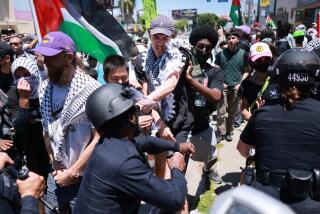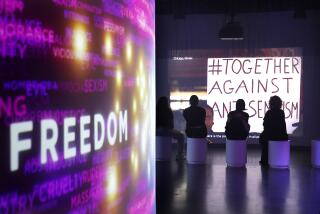‘Lone Gunman’ Killed Kahane, Detective Says : Assassination: Investigators find no evidence of Arab conspiracy in shooting of militant Israeli rabbi.
- Share via
NEW YORK — Authorities said Tuesday that the alleged assassin of controversial Jewish activist Rabbi Meir Kahane was an Egyptian-born municipal maintenance worker in New York City’s criminal courts building who apparently acted alone.
Chief of Detectives Joseph Borrelli said that initial indications were that 34-year-old El-Sayyid A. Nosair, who arrived in the United States from Egypt in 1981 and became a naturalized citizen last year, was not part of any conspiracy with other individuals or groups.
“Right now, what we have is a lone gunman who committed a homicide in New York,” Borrelli told reporters at a late afternoon news conference.
Nosair, who remained at Bellevue Hospital in critical but stable condition, was formally charged with murder and related charges on Tuesday. Nosair was wounded by a U.S. Postal Service guard as he fled the hotel were Kahane was killed. Authorities said that it might be several days until Nosair would be capable of responding to intensive questioning.
Kahane, 58, a founder of the Jewish Defense League and former member of the Israeli Parliament who advocated expelling Arabs from Israel and its territories, was shot Monday night. He had just finished addressing a group of his supporters known as Jewish Idea at the New York Marriott East Side Hotel when a gunman identified as Nosair approached and began shooting.
Police were seeking a search warrant to enter the New Jersey residence where Nosair is believed to have lived with his wife, Caren, and three young children.
Borrelli said that detectives had questioned Nosair’s wife, but that she claimed to have no prior knowledge of her husband’s whereabouts on the night of Kahane’s murder or of any possible motive Nosair might have had for the shooting.
“In her words, she’s a good Muslim wife and never questions her husband,” he said.
Police Commissioner Lee P. Brown said that, despite no signs of a conspiracy, authorities were taking extensive precautions to guard both Jewish and Arab institutions in the city, including the Israeli and Egyptian missions to the United Nations, the offices of El Al Israel Airlines and New York’s local Jewish publications.
“We’re working very closely with the FBI and the State Department and all relevant international agencies to determine where the suspect came from and if he had any connection with any other individuals . . . or any connection with any particular group or organization,” Brown said at the news conference.
The commissioner said that the police investigation was being conducted with a view toward the problems in the Middle East and “how those problems may affect the safety of residents here in the city of New York.”
However, he said, police were unaware of any threats against Kahane before the shooting and were not providing him with protection.
As police delivered the status report on their investigation, thousands of mourners--some holding signs vowing “Revenge” and “Never Again”--packed a small, yellow-brick Brooklyn synagogue and the street outside during funeral services for Kahane.
The controversial Jewish activist was lauded as “a talented leader . . . a giant and a sword” during the militant but emotional afternoon ceremony.
Security was heavy as police closed the block in front of the synagogue to all vehicular traffic. The crowd was so thick that many who wished to pay tribute to Kahane were unable to enter the synagogue. After the service, Kahane’s body was flown from John F. Kennedy International Airport to Israel for burial.
Police and immigration officials said Tuesday that Nosair was born in Port Said, Egypt, in 1955 and arrived in the United States from Egypt in 1981. Two years later, while residing in Pittsburgh, Pa., he received permanent alien status, and in 1989, in Newark, N.J., he became a naturalized American citizen.
He met and married his wife, an American who practices the Islamic faith, in Pittsburgh. They have two boys and a girl, the oldest of whom is 8.
He has worked as an air-conditioning maintenance man since April, 1988, at the criminal courts building in Manhattan, according to a spokesman for the city Department of General Services.
Borrelli said that Nosair’s co-workers at the criminal courts building had been questioned but they reported “nothing unusual” about Nosair.
“We have not as yet determined and gotten a true motive in this case,” Borrelli said. “There were no shouts . . . no conversation between the assailant and Rabbi Kahane before the shooting.”
Kahane was shot just after he delivered a lecture about Israel and the Persian Gulf crisis to about 100 people in the hotel. Police said he was struck by at least one bullet fired from a .357-caliber Ruger revolver.
Kahane was rushed to Bellevue Hospital, where physicians pronounced him dead at 9:57 p.m.
Police said that after shooting Kahane, Nosair fled down a hallway, where he encountered Irving Franklin, 73, who was selling literature about the meeting. Nosair shot Franklin in the leg and continued his flight.
Franklin was in stable condition at Bellevue.
Police said Nosair commandeered a taxi at gunpoint outside the hotel but jumped out after the cab had driven only about 75 feet at East 48th Street and Lexington Avenue.
Upon leaving the taxi, Nosair was confronted by a uniformed U.S. Postal Service police officer, Carlos Acosta, 55. Borrelli said Nosair fired at Acosta, striking him in the chest.
“Fortunately, he was wearing his bulletproof vest,” the chief of detectives said.
Acosta wounded Nosair in the chin during a brief exchange of gunfire.
Nosair was charged with second-degree murder, first-degree attempted murder, second-degree assault, criminal possession of a weapon and unlawful imprisonment for holding the cabdriver hostage briefly.
Police said the serial number had been obliterated from the revolver Nosair allegedly used to slay Kahane.
For more than two decades, Kahane has been a controversial figure, both in the United States and Israel, where he was expelled from the parliament after his extremist party was banned.
Most mainstream Jewish organizations condemned his philosophy and tactics.
Many Jews throughout Orange County were stunned by Kahane’s murder, even as they deplored any act of violence of Jew against Arab or Arab against Jew.
“People are shook--I feel it all over. Everybody’s talking about it,” said Rabbi David Eliezrie, vice president of the rabbinical council of Orange County and Long Beach.
Eliezrie credited Kahane with prodding a generation to confront the two greatest issues of modern Jewish life: “Assimilation in the United States and the Arab-Israeli conflict. . . .”
“Even the Jews on the left who disagreed with him violently are shook up by the fact that a Jewish leader could be assassinated in the United States by an Arab,” said the rabbi, who also heads the Beth Meir HaChohen orthodox synagogue in Yorba Linda.
“I hope that the Arab terrorists groups in the Middle East are not bringing their brand of murder and mayhem to the United States and that this was the action of an isolated individual.”
VIOLENCE IN ISRAEL--Two Palestinians are killed in wake of Kahane slaying. Authorities fear more attacks. A35
More to Read
Sign up for Essential California
The most important California stories and recommendations in your inbox every morning.
You may occasionally receive promotional content from the Los Angeles Times.










